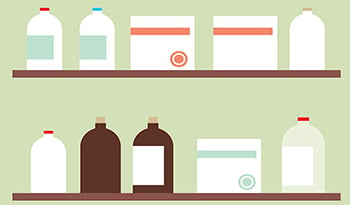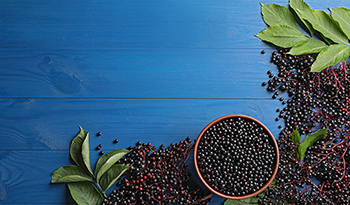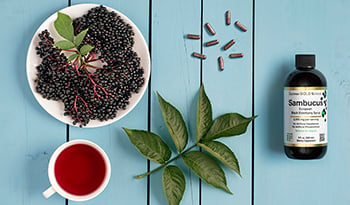How To Improve Your Lymphatic System: A Doctor's Guide

Key Takeaways
- Your lymphatic system is a crucial part of your immune system that helps remove waste, toxins, and excess fluid from your body.
- A sluggish lymphatic system can lead to weakened immunity, swelling, fatigue, and brain fog.
- You can support lymphatic health through simple, natural methods like specific exercises, hydration, and targeted herbal supplements.
Why The Lymphatic System Is Important
Whether it's from heavy metals in our water supply or pesticides on our food, toxins enter our bodies from the environment constantly. These toxins can accumulate in the body and may cause damage to our immune system or trigger an unhealthy hormone balance.
Thankfully, we have a series of systems throughout the body that can remove these toxins from circulation and detoxify them quickly, concurrently supporting overall immune health. Certain supplements and vitamins can help these systems to optimize their function and support lymphatic health.
What If My Lymphatic System Isn’t Healthy?
If your lymphatic system slows or stagnates, toxins will accumulate, and immune cells won’t be delivered to areas of the body where they are needed. This may cause swelling and pain, and weaken your body’s ability to fight infection.
Ways To Improve Lymphatic Health
Our liver is our “great detoxifier” involved in over 300 different processes in the body, including metabolism, excretion, and body defense. Given all the jobs the liver does, it needs a little help.
The liver produces a lot of lymph, so if you support the liver, you can help to support healthy cleansing of the body. The digestive system also helps eliminate toxins, so by supporting a healthy digestive system, you are further supporting lymphatic health.
Lifestyle changes you can make to stimulate your lymphatic circulatory system include:
- Drinking water
- Exercising regularly
- Eating healthy foods
- Getting a massage
- Getting lymphatic drainage therapy
- Trying a detox or cleanse
Many detoxes/cleanses are out there, so it’s important to do your research and find the right one.
What To Look For In A Detox Or Cleanse Supplement
You want two steps in a cleanse: something to support healthy detoxification and bind to toxins, and the other to support healthy cleansing and elimination of those toxins.
You can go for a cleanse/detox that is all-inclusive or choose a combination of individual supplements and vitamins to support your lymphatic health.
Milk thistle
Milk thistle (Silybum marianum) is a plant that has been used for thousands of years. The main component of milk thistle is a compound called silybin that is extracted from the plant.
This botanical’s main use in modern society is to support liver health—silybin is a known hepatoprotective herb. When the liver performs one of its main functions, breaking down toxins, these toxins can harm the liver and decrease its efficiency.
Milk thistle is a powerful antioxidant that helps the liver do its job better. Think of milk thistle as the liver’s cup of coffee in the morning. When the liver is awake (healthy), it can perform all of its functions better, including making lymph.
Dandelion
When many people think of dandelion (Taraxacum officianale), they often think of the pesky weed. Dandelion doesn’t get credit for the fact that it is full of vitamins A, B, C, and D. It also can support immune, liver, and kidney health.
While the liver breaks down toxins, it’s the job of the kidneys to eliminate these toxins in the urine. The antioxidant properties (in compounds called flavonoids) found in dandelion help to support healthy detoxification processes and the elimination of toxins from the body.
Chlorella
Chlorella (Chlorella vulgaris) is a green algae, rich in protein, that can help protect the body from heavy metals like mercury.
Chlorella chelates, or wraps itself, around toxins and stops them from being reabsorbed by the body. It has also been shown to protect against mercury in the digestive tract.
Apple Pectin
Apple pectin is a type of soluble fiber naturally found in apples. The extracted pectin is commonly used to thicken jams, but it can also be taken as a dietary supplement.
Similar to chlorella, apple pectin binds to heavy metal toxins like mercury and helps with their elimination through the digestive system.
Uva Ursi
Uva ursi (Arctostaphylos uva-ursi) is a plant commonly known as bearberry. This botanical has anti-inflammatory properties that support a healthy urinary tract.
The urinary tract is one of the body’s main avenues for eliminating water-soluble toxins and other unwanted materials and waste products.
Burdock
Burdock (Arctium lappa) is a botanical that has been used in Chinese culture for years. It’s known to support healthy circulation of both blood and lymph. Burdock can also support a healthy urinary system, key in removing toxins from the body.
When choosing to support your lymphatic health, there are many options, including premade cleanses/detoxes and individual supplements containing compounds to support a healthy liver, as well as digestive and urinary functions. In addition to eliminating toxins, these systems support lymphatic health and the immune system.
Understanding Your Lymphatic System
What Is The Lymphatic System?
Like the cardiovascular circulatory system, the lymphatic system is a network of specialized vessels that perform exchange and transport functions. Your body's blood circulatory system has a central pump—the heart—that moves blood throughout the system.
The lymphatic system is different. The lymphatic system doesn’t have a central pump like the circulatory system. Instead, the lymphatic system is stimulated by:
- Gravity
- Muscle Contraction (Exercise)
- Hydrotherapy (Alternating Hot And Cold Water On The Skin)
- Breathing
- Lymph Drainage Therapy
- Massage
When lymph is created, the new lymph pushes the current lymph through the vessels. Additionally, pressure from tissues external to the lymphatic vessels, like smooth muscle, propels the lymph forward.
Lymph also doesn’t circulate; rather, tissues create fluid, and the lymphatic system delivers that fluid, or lymph, back to the blood circulatory system again to maintain blood pressure/fluid balance.
Types Of Circulation
Healthy circulation results from two systems that work together: your cardiovascular circulatory system and your lymphatic circulatory system. Your heart pumps blood through your cardiovascular system. As this nutrient-rich blood travels away from your heart, it passes through smaller and smaller blood vessels.
In nearby cells, nutrients and wastes are exchanged through the blood. Fluid is then squeezed out of the blood vessels; this fluid is called interstitial fluid or lymph. The lymphatic system absorbs this lost fluid and recycles it back into the blood to maintain healthy blood pressure.
Your lymphatic system works directly with your cardiovascular system to keep blood and lymphatic fluids in balance and flush out toxins from your body. It also carries immune cells throughout the body to help defend against infections.
Lymphatic Health And Your Immune System
Lymphatic vessels are present in almost every tissue except bone marrow, cartilage, the cornea of the eye, and the central nervous system. Lymphatic networks are found in the digestive system, namely within the oral mucosa (the slimy tissue that lines the inside of the mouth), the tongue, salivary glands, and tonsils. These tissues strategically contain lymphatic vessels, lymph nodes, and immune cells.
Maintaining good health in both circulatory systems is one key to supporting a healthy immune system. Lymph passes through lymph nodes, which are specialized tissues that perform immune surveillance, making sure there aren’t any infectious pathogens.
The foods you eat from the outside world have the potential to contain bacteria, antigens, or other unwanted substances. The lymphatic system's job is to perform immune surveillance on anything you consume.
Think of this system as a network of security guards, focused on protecting the body from any outside invaders. If, for some reason, pathogens get past this initial defense, lymphatic systems are also found in both the small and large intestines.
Additionally, the pancreas, liver, and gallbladder have lymphatic systems. Lymphatic fluid is delivered to at least one lymph node prior to entry into the bloodstream.
References:
- Breslin, J.W., Yang Y., Scallan J., et al.; Lymphatic vessel network structure and physiology. Compr Physiol, 2018. 9(1): p. 207-99.
- Prior N., Inacio P., Huch M.; Liver organoids: from basic research to therapeutic applications. Gut, 2019. 68(12): p. 2228-37.
- Bijak M.; Silybin, a major bioactive component of milk thistle – chemistry, bioavailability, and metabolism, 2017. 22(11): p. 1942.
- Martinez M., Poirrier P., Chamy R.; Taraxacum officinale and related species. J Ethnopharmacol. J, 2015. 169: p. 244-62.
- Krienitz L., Huss V.A., Bock C.; Chlorella: 125 years of the greenest survivalist. Trends Plant Sci, 2015. 20(2): p. 67-9.
- Kartel M.T., Kupchick L.A., Veisov B.K..; Evaluation of pectin binding of heavy metal ions in aqueous solutions. Chemosphere, 1999. 38(11): p. 2591-96.
- Matsuda H., Tanaka T., Kubo M.; Pharmacological studies on leaf of Arctostaphylos uva-ursi [Japanese; abstract]. Yakugaku Zasshi, 1991. 111(4-5): p. 253–58.
- Bensky, D., Gamble, A., Kaptchuk, T.J.; Chinese Herbal Medicine: Materia Medica. Seattle, Eastland; 1993.
DISCLAIMER:This Wellness Hub does not intend to provide diagnosis...
















































































 Table of Contents
Table of Contents
















